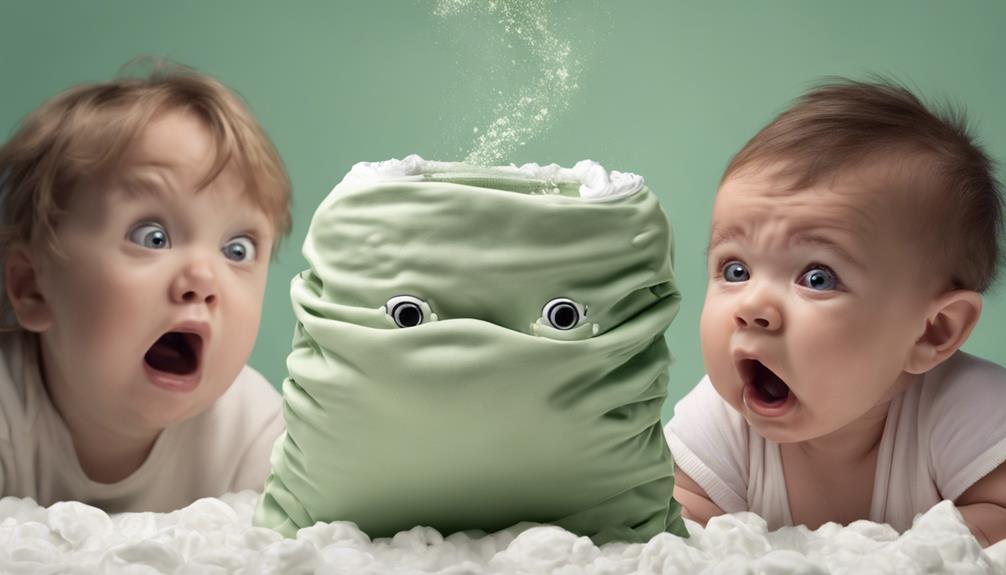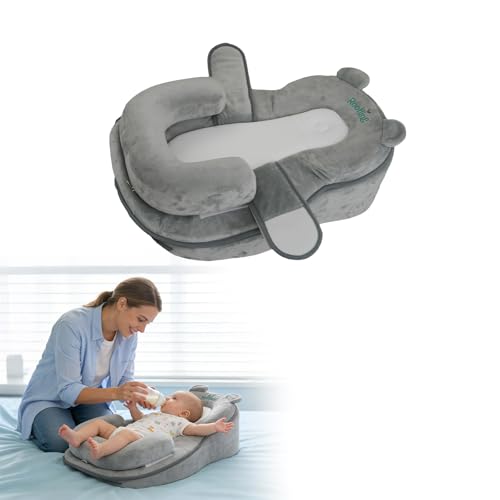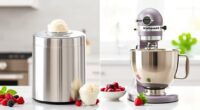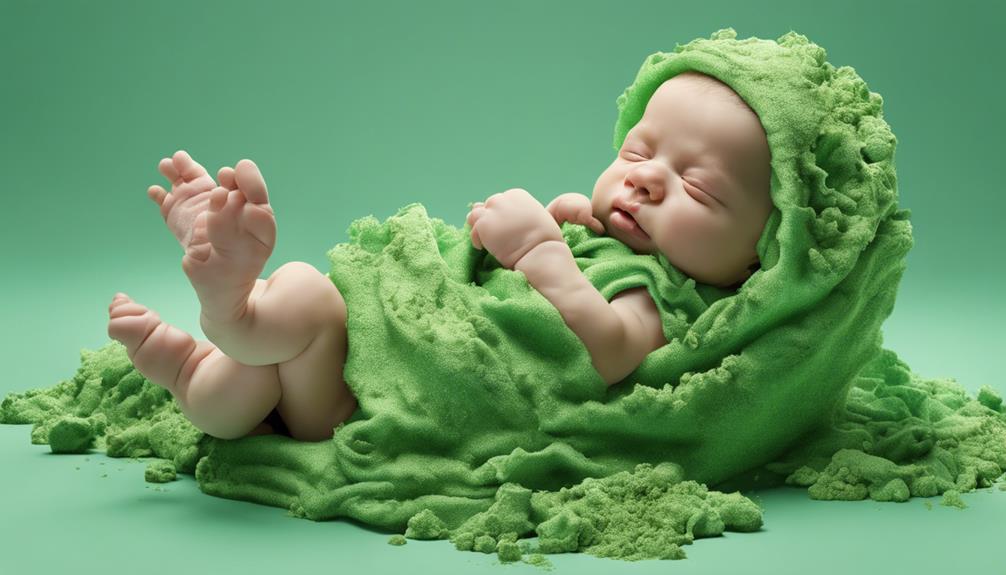When it comes to newborn bubbly poop, it's like a puzzle with many pieces. Understanding what it signifies can provide valuable insights into your baby's health.
From diet adjustments to possible digestive issues, the clues hidden in those tiny bubbles can uncover a lot about your little one's well-being.
So, let's unravel the mystery together and shed light on what might be causing those bubbly surprises in your baby's diaper.
Key Takeaways
- Bubbly poop in newborns may signal issues like high foremilk intake or poor digestion.
- Consult a healthcare provider if your baby shows signs of discomfort or incomplete digestion.
- Implement proper feeding techniques and seek guidance from a lactation consultant if needed.
- Monitoring your baby's digestive health is crucial to detect any potential issues early on.

Frida Baby 3-in-1 Rectal, Underarm & Oral Thermometer for Kids, Digital Baby Thermometer for Infants, Toddlers, & Kids, Quick & Accurate Temperature Check, Includes Carrying Case for Storage
ACCURATE FOR ALL AGES: Designed for infants, toddlers, and kids, this thermometer delivers reliable readings whether used rectally,…
As an affiliate, we earn on qualifying purchases.
As an affiliate, we earn on qualifying purchases.
Possible Causes of Bubbly Poop in Newborns
When observing newborns with bubbly poop, it's essential to ponder various potential causes that could be contributing to this stool consistency. Bubbly poop in a baby may signify a high intake of foremilk, the watery milk that comes at the beginning of a feeding session.
An imbalance in the baby's breastfeeding technique could lead to them consuming more foremilk, causing excess gas and frothy stools. This imbalance may result in poor digestion and absorption of essential nutrients, manifesting as bubbly or foamy poop.
Adjusting feeding positions, ensuring complete emptying of one breast before switching, and employing proper latching techniques can help alleviate bubbly poop in newborns. Seeking guidance from a lactation consultant or healthcare provider is crucial to improve breastfeeding practices and address any issues contributing to the foamy poop.
Baby's health and comfort are paramount, making it essential to address the root cause of bubbly poop through proper breastfeeding techniques and expert guidance.

Breast Teaching Model Knitted Simulation Fake Breasts for Lactation Nursing Training Education and Breastfeeding Position Exercises and Classroom Teaching (Brown, 1 pcs)
Safe and reliable raw materials-Made of high-quality cotton cloth and fabrics, soft and comfortable, with real touch, ensuring…
As an affiliate, we earn on qualifying purchases.
As an affiliate, we earn on qualifying purchases.
Signs of Health Issues in Newborns

Excessive gas in the digestive system of newborns can manifest as bubbly poop, indicating potential health issues that require monitoring and prompt intervention. It's essential to pay attention to signs such as foamy stool, frequent burping, and discomfort during feedings, as these could be indicative of underlying problems.
Newborns experiencing colic may exhibit increased crying episodes, especially after feeding, which can be distressing for both the baby and parents. Digestive issues like gas buildup may contribute to the presence of bubbly poop and should be addressed promptly to alleviate any discomfort the baby may be experiencing.
Monitoring your baby's poop consistency and frequency, along with observing their feeding patterns and behavior, can provide valuable insights into their overall health. If bubbly poop is accompanied by persistent crying, feeding issues, or other concerning symptoms, consulting a pediatrician is essential for proper evaluation and guidance.

MYLICON Infants Gas Relief Drops for Infants and Babies, Dye Free Formula, 1 Fluid Ounce
Mylicon, the #1 pediatrician recommended brand, has been providing safe, effective relief of infant gas for generations
As an affiliate, we earn on qualifying purchases.
As an affiliate, we earn on qualifying purchases.
When to Consult a Healthcare Provider
Consulting a healthcare provider is essential if your newborn's bubbly poop is accompanied by signs of discomfort. Bubbly poop in newborns can be a result of excessive gas in the digestive system, indicating incomplete digestion or a reaction to foods in their diet.
If your baby is experiencing persistent discomfort along with bubbly poop, it may be necessary to seek medical advice to ascertain any underlying issues. Healthcare providers can offer guidance on monitoring the frequency and consistency of the bubbly poop to help identify potential concerns early on.
While occasional bubbly poop may not be a cause for alarm, consistent discomfort or changes in your newborn's poop should prompt a consultation with a healthcare provider. By addressing these issues promptly, healthcare providers can assess the situation, provide necessary interventions, and offer support to make sure your baby's digestive health is on the right track.

XFaa Rootling Baby Feeding Pillow, Anti Overflow Feeding Pillow for Reducing Spit-Up, Safety Nursing Pillow, Baby Lounger Reflux Wedge Breastfeeding, Removable top and Bottom (Gray, Small)
【Dual-Function Detachable Design】: The removable wedge segment transforms this pillow into a flat surface when detached. Perfect for…
As an affiliate, we earn on qualifying purchases.
As an affiliate, we earn on qualifying purchases.
Tips for Managing Bubbly Poop

To effectively manage your newborn's bubbly poop, focus on implementing proper feeding techniques to minimize air intake during feeding sessions. For breastfed babies, make sure a proper latch and positioning during feeding to prevent excess air swallowing. Burp your baby after each feed to help release trapped gas, reducing the likelihood of foamy stools.
Additionally, consider feeding smaller amounts more frequently to prevent overfeeding and reduce gas buildup in the digestive system. If your baby is experiencing diarrhea or if the bubbly poop is persistent and accompanied by other concerning symptoms like fussiness or poor weight gain, seek medical advice promptly.
Be mindful of potential food allergies that could be causing foamy stools in your baby. Remember, each baby is unique, and consulting with a healthcare professional can provide tailored guidance on managing your baby's bowel movements during this phase.
Importance of Monitoring Baby's Digestive Health
Monitoring a baby's digestive health is essential in detecting and addressing potential issues that may be causing bubbly poop. As caregivers, observing changes in baby poop colours, such as dark green baby poop or the presence of mucus in their stool, can provide valuable insights into the baby's health.
Factors like breastfeeding, a change in diet, or a baby's immature digestive tract can contribute to variations in stool consistency. While bubbly poop in newborns is often normal, persistent bubbly poop accompanied by symptoms like colic or signs of lactose intolerance may require further evaluation.
Frequently Asked Questions
Why Is My Newborn's Poop Bubbly?
We notice our newborn's poop being bubbly. This can be due to excess air swallowed during feeding or the natural fermentation process in their developing digestive system. It's common in breastfed babies and usually normal unless other symptoms arise.
What Does Bubbling Poop Mean?
Bubbling poop in newborns can indicate digestive issues like excess gas. Monitoring consistency and frequency helps determine the cause. Observing other symptoms for a thorough understanding of the baby's health is crucial.
What Does Frothy Baby Poop Look Like?
Frothy baby poop can be bubbly, airy, and have a foamy texture, resembling bubbles in the stool. It's often light in color, like whipped meringue. Monitoring its frequency and persistence helps identify potential issues.
What Does Unhealthy Newborn Poop Look Like?
Unhealthy newborn poop may vary in appearance, consistency, and odor, signaling digestive issues. Symptoms like fussiness and bloating often accompany abnormal poop. It's important to monitor and seek advice from a pediatrician for proper evaluation and treatment.
Conclusion
To sum up, understanding the reasons behind newborn bubbly poop is essential for ensuring their well-being. Monitoring for signs of health issues and seeking timely medical advice can help address any underlying concerns.
Remember, proper management and monitoring of your baby's digestive health are paramount for their overall comfort and development. Stay vigilant, stay informed, and seek support when needed to safeguard your little one's health.








